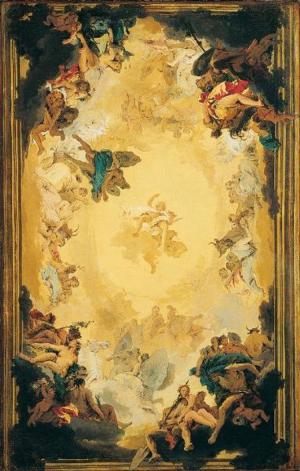| Author: | William Roscoe Thayer | ISBN: | 9781465625397 |
| Publisher: | Library of Alexandria | Publication: | March 8, 2015 |
| Imprint: | Language: | English |
| Author: | William Roscoe Thayer |
| ISBN: | 9781465625397 |
| Publisher: | Library of Alexandria |
| Publication: | March 8, 2015 |
| Imprint: | |
| Language: | English |
One by one the nations of the world come to their own, have free play for their faculties, express themselves, and eventually pass onward into silence. Our age has beheld the elevation of Prussia. Well may we ask, “What has been her message? What the path by which she climbed into preëminence?” That she would reach the summit, the work of Frederick the Great in the last century, and of Stein at the beginning of this, portended. It has been Bismarck’s mission to amplify and complete their task. Through him Prussia has come to her own. What, then, does she express? The Prussians have excelled even the Romans in the art of turning men into machines. Set a Yankee down before a heap of coal and another of iron, and he will not rest until he has changed them into an implement to save the labor of many hands; the Prussian takes flesh and blood, and the will-power latent therein, and converts them into a machine. Such soldiers, such government clerks, such administrators, have never been manufactured elsewhere. Methodical, punctilious, thorough, are those officers and officials. The government which makes them relies not on sudden spurts, but on the cumulative force of habit. It substitutes rule for whim; it suppresses individual spontaneity, unless this can be transformed into energy for the great machine to use. That Prussian system takes a turnip-fed peasant, and in a few months makes of him a military weapon, the length of whose stride is prescribed in centimetres—a machine which presents arms to a passing lieutenant with as much gravity and precision as if the fate of Prussia hinged on that special act. It takes the average tradesman’s son, puts him into the educational mill, and brings him out a professor,—equipped even to the spectacles,—a nonpareil of knowledge, who fastens on some subject, great or small, timely or remote, with the dispassionate persistence of a leech; and who, after many years, revolutionizes our theory of Greek roots, or of microbes, or of religion. Patient and noiseless as the earthworm, this scholar accomplishes a similarly incalculable work. A spirit of obedience, which on its upper side passes into deference not always distinguishable from servility, and on its lower side is not always free from arrogance, lies at the bottom of the Prussian nature. Except in India, caste has nowhere had more power. The Prussian does not chafe at social inequality, but he cannot endure social uncertainty; he must know where he stands, if it be only on the bootblack’s level. The satisfaction he gets from requiring from those below him every scrape and nod of deference proper to his position more than compensates him for the deference he must pay to those above him. Classification is carried to the fraction of an inch. Everybody, be he privy councilor or chimney-sweep, is known by his office. On a hotel register you will see such entries as “Frau X, widow of a school-inspector,” or “Fräulein Y, niece of an apothecary.” This excessive particularization, which amuses foreigners, enables the Prussian to lift his hat at the height appropriate to the position occupied by each person whom he salutes. It naturally develops acuteness in detecting social grades, and a solicitude to show the proper degree of respect to superiors and to expect as much from inferiors,—a solicitude which a stranger might mistake for servility or arrogance, according as he looked up or down. Yet, amid a punctilio so stringent, fine-breeding—the true politeness which we associate with the word “gentleman”—rarely exists; for a gentleman cannot be made by the rank he holds, which is external, but only by qualities within himself.
One by one the nations of the world come to their own, have free play for their faculties, express themselves, and eventually pass onward into silence. Our age has beheld the elevation of Prussia. Well may we ask, “What has been her message? What the path by which she climbed into preëminence?” That she would reach the summit, the work of Frederick the Great in the last century, and of Stein at the beginning of this, portended. It has been Bismarck’s mission to amplify and complete their task. Through him Prussia has come to her own. What, then, does she express? The Prussians have excelled even the Romans in the art of turning men into machines. Set a Yankee down before a heap of coal and another of iron, and he will not rest until he has changed them into an implement to save the labor of many hands; the Prussian takes flesh and blood, and the will-power latent therein, and converts them into a machine. Such soldiers, such government clerks, such administrators, have never been manufactured elsewhere. Methodical, punctilious, thorough, are those officers and officials. The government which makes them relies not on sudden spurts, but on the cumulative force of habit. It substitutes rule for whim; it suppresses individual spontaneity, unless this can be transformed into energy for the great machine to use. That Prussian system takes a turnip-fed peasant, and in a few months makes of him a military weapon, the length of whose stride is prescribed in centimetres—a machine which presents arms to a passing lieutenant with as much gravity and precision as if the fate of Prussia hinged on that special act. It takes the average tradesman’s son, puts him into the educational mill, and brings him out a professor,—equipped even to the spectacles,—a nonpareil of knowledge, who fastens on some subject, great or small, timely or remote, with the dispassionate persistence of a leech; and who, after many years, revolutionizes our theory of Greek roots, or of microbes, or of religion. Patient and noiseless as the earthworm, this scholar accomplishes a similarly incalculable work. A spirit of obedience, which on its upper side passes into deference not always distinguishable from servility, and on its lower side is not always free from arrogance, lies at the bottom of the Prussian nature. Except in India, caste has nowhere had more power. The Prussian does not chafe at social inequality, but he cannot endure social uncertainty; he must know where he stands, if it be only on the bootblack’s level. The satisfaction he gets from requiring from those below him every scrape and nod of deference proper to his position more than compensates him for the deference he must pay to those above him. Classification is carried to the fraction of an inch. Everybody, be he privy councilor or chimney-sweep, is known by his office. On a hotel register you will see such entries as “Frau X, widow of a school-inspector,” or “Fräulein Y, niece of an apothecary.” This excessive particularization, which amuses foreigners, enables the Prussian to lift his hat at the height appropriate to the position occupied by each person whom he salutes. It naturally develops acuteness in detecting social grades, and a solicitude to show the proper degree of respect to superiors and to expect as much from inferiors,—a solicitude which a stranger might mistake for servility or arrogance, according as he looked up or down. Yet, amid a punctilio so stringent, fine-breeding—the true politeness which we associate with the word “gentleman”—rarely exists; for a gentleman cannot be made by the rank he holds, which is external, but only by qualities within himself.















